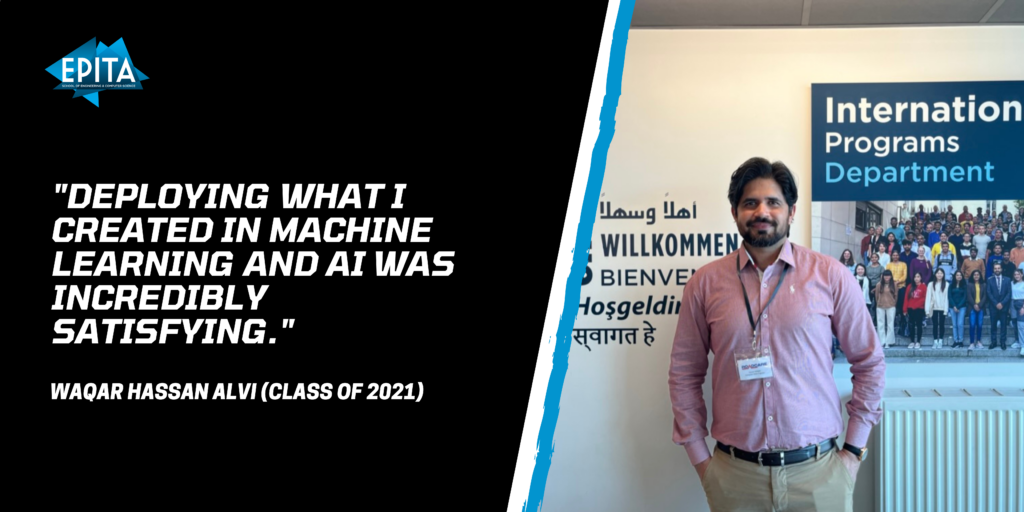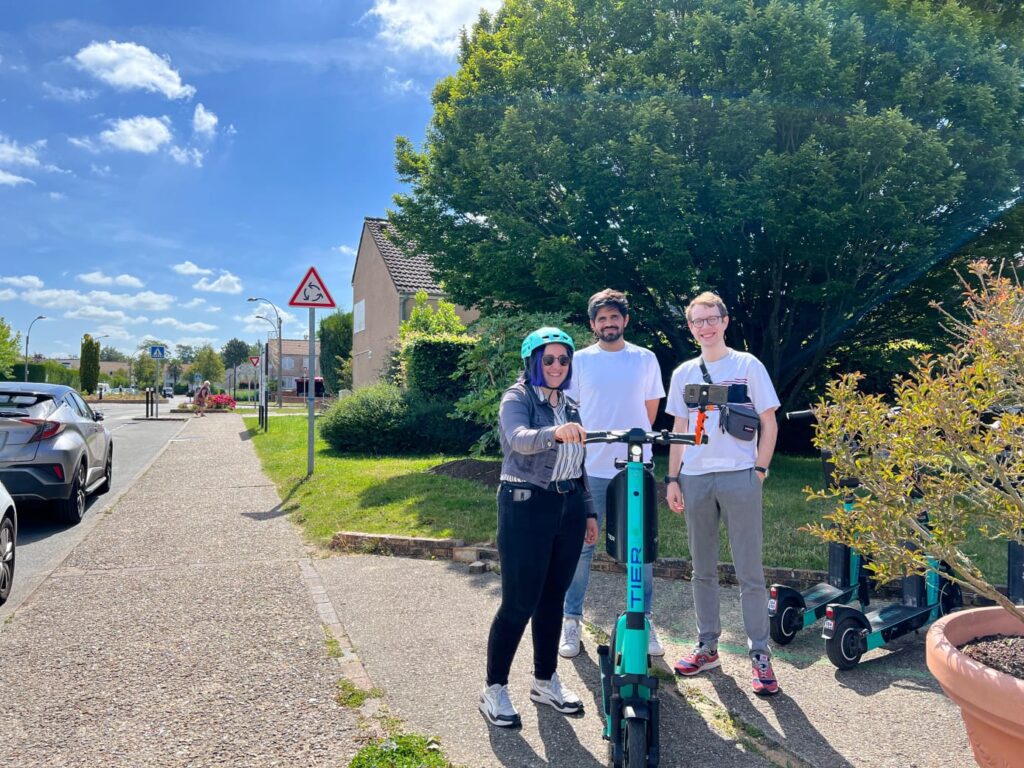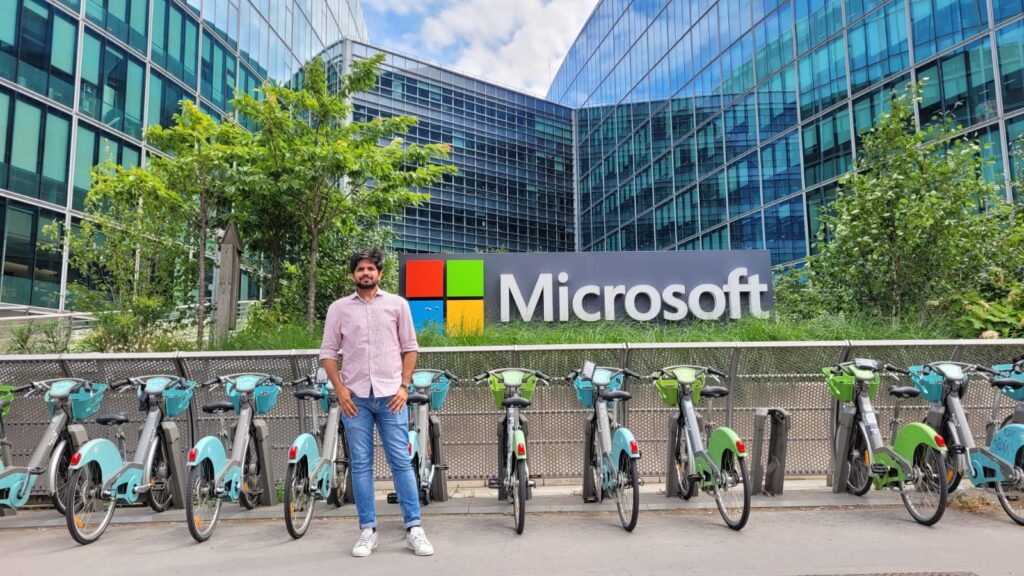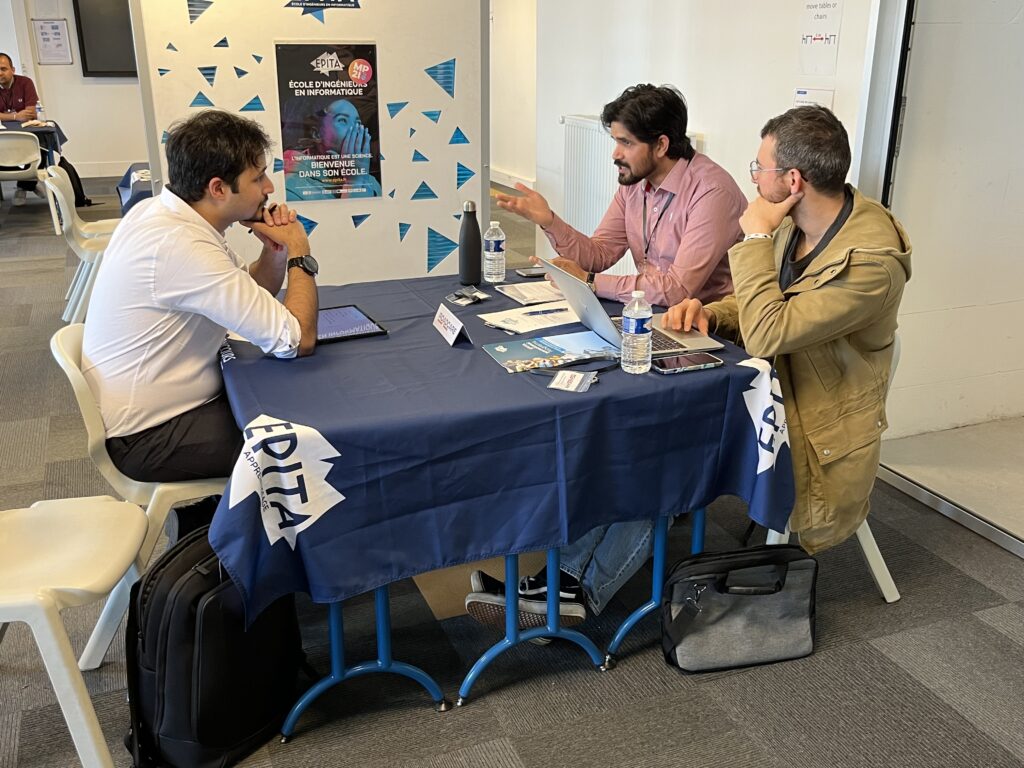Waqar Hassan ALVI Class of 2021 MSc Computer Science: “Deploying what I created in machine learning and AI was incredibly satisfying”
Embark on a journey through the academic and professional experiences of Waqar Hassan ALVI, a distinguished graduate from EPITA’s Class of Spring 2021. Originating from Pakistan, Waqar shares his motivations for venturing into machine learning and artificial intelligence, highlighting the transformative impact of his time at EPITA and the significance of cultural diversity in shaping his educational trajectory. From favorite courses to practical applications in his role as a Computer Vision Engineer at Roadcare, Waqar’s story offers valuable insights for those navigating the dynamic landscape of technology.

Why did you choose your degree?
Coming from Pakistan, I completed my Bachelor’s in Computer Science in 2015 in my home country. After working in web development for three to four years in both Pakistan and Dubai, I had been getting disinterested by my job and I felt a need for a more exciting and challenging path. The rapid evolution of machine learning and artificial intelligence caught my attention. When COVID pandemic broke out, we all had to stay at home, and I finally had the time to think about it. I decided to do a Master’s degree in Data Science and Analytics, a long-time aspiration.
Why did you choose to study at EPITA?
France, initially not my top choice, became the destination due to family ties and recommendations from seniors who spoke highly of EPITA’s IT programs. My brother lives in France and he was the one who convinced me to come to this country. As for the choice of university, some of my seniors of my Bachelor’s degree studied in EPITA. I reached out to one of them and said that EPITA was one of the best schools in IT and persuaded me to study there. “If you want to do your Master in IT, EPITA was the best choice. You don’t have to look anywhere else,” he said. I therefore applied to EPITA, received an admission offer, went through the application procedure, and arrived at the campus. Initially after applying to EPITA for admission, I actually thought of switching to another school. However, the support that EPITA gave me through emails along the way was immense and facilitated my candidate journey. That was why I finally opted for EPITA.
How did you feel about the cultural diversity at EPITA?
The cultural diversity at EPITA was initially a shock, despite my previous experience in Dubai. Moving to a new country always presents its cultural challenges. Luckily, EPITA has a program to assist its students to manage this cultural shock. For example, they organized the Integration Week at the beginning of the semester. The Week played a crucial role in helping students navigate the international environment. The experience of working with individuals from diverse backgrounds on team projects, despite cultural differences, proved invaluable.
Moreover, EPITA offers mandatory French Language courses which apart from making you learn the language – engage you in outdoor activities too to brief you about the historic background of the country and the significance of important heritage sites.
EPITA’s emphasis on cultural understanding and collaboration enhanced my learning experience. Now I have graduated and am working at Roadcare.
What courses did you enjoy the most? How does your study relate to your career?
While EPITA’s curriculum covered essential foundational courses in the first two semesters, it was the specialized courses, particularly MLOps taught by Mr. Alaa Bakhti, that stood out. Mr. Bakhti’s practical approach in implementing and deploying machine learning architectures in a production environment sparked my interest. The hands-on project of creating a machine learning pipeline and deploying it was not only challenging but incredibly satisfying.
I still remember a project that Mr. Bakhti asked us to do. During the project, we had to create a pipeline for a machine learning architecture and then deploy it. I used to stay at EPITA until 11 o’clock in the evening to work on the project for 3 consecutive weeks and returned home only to sleep. I was working full time on it because I was passionate about it. At the end, when I saw the pipeline work in a production environment, it was incredibly satisfying and exciting. When we presented our results to Mr. Bakhti, and explained the project, I felt amazingly good. The skills acquired during this course have directly translated into my role as a Computer Vision & MLOps Engineer at Roadcare.
What is your favorite memory from studying at EPITA?
Joining the Integration Week stands out as one of the best memories. I am kind of introvert and is not used to open to people. However, the Integration Week has opened me in a sense. I felt comfortable to talk to different people during the Week.
The team-building games and diverse group of students provided me a platform to bond with individuals from various cultural backgrounds, an experience that opened me up and enriched my perspective. It was amazing to meet people from so many different cultural backgrounds. I am still in contact with some of my teammates. Although I lived in Dubai, which is a cosmopolite city, and now I am living in France, there is nothing quite similar than the Integration Week which had broadened my perspective.
Along with that, I will always cherish the countless moments spent with my friends in the labs, stairs and cafeterias working on projects and talking about what the future holds for us in France.

How did EPITA help you find your internship and job?
EPITA’s virtual job dating event during the COVID-19 pandemic was instrumental in securing my internship at Roadcare.
I had a few interviews with several companies on that day, and the one with Roadcare was the last interview I did. The interview went really well. I possessed the skillset they were searching for. I also had the full stack development experience, which was a bonus for them.
Once the interview was done, about 30 minutes after the interview, I received an email from them saying that I was hired! I guess that I was the first one to get hired.
What is your job role now?
Currently, I serve as a Computer Vision & MLOps Engineer at Roadcare, specializing in both MLOps and Research and Development (R&D). In the R&D domain, I focus on computer vision architecture and algorithms, utilizing skills learned at EPITA. Our work at Roadcare involves developing AI solutions to analyze data collected by VINCI, the largest construction company in France, to detect road defects and propose solutions. The application of AI to address real-world issues is incredibly rewarding. In the MLOps domain, I am responsible for deploying all the AI solutions that we create at Roadcare to Production. To maintain its availability, scalability and to handle the AI model versioning in Production.
I didn’t have a lot of professional experience in the computer vision domain at the beginning of my internship, even though I had already learnt about MLOps at EPITA. Luckily, the colleagues at Roadcare were very helpful and patient. They provided me with all the resources and research papers that were needed to be read by me to understand the work. I started getting a hang of it after one month.
Roadcare is in fact part of the VINCI, the largest construction group in France. Roadcare as a startup receives funding from the group. What we do is to develop an AI to analyze the huge amount of data collected by VINCI and their sister companies. The AI we develop analyzes this data and detects if there are any defects on the roads and suggests solutions. For example, if the defects are not serious, the AI informs the client of the location and the coordinates of the defect, then suggests a solution to the clients, and let them know they can take time to fix it. If the defects are serious, the AI will inform the client of the gravity of the situation and urge them to fix them as soon as possible.
Now our company is expanding the business and seeks to work with some cities and districts in Paris, cities in Canada and maybe in the UK too. We analyze the roads for the city or the district, inform them of the analysis, and provides them with cost- and time-effective solutions. The solutions are important, because only 10% of the roads in France are maintained regularly, as far as I remember. It showed the huge potential of development in this area. It is really exciting for me to work for it, because it utilizes AI to build concrete solutions. I feel satisfying when I showed the results to the clients. My job has a positive impact on the society. I am actually making a difference. That’s huge!
As for the second part, I am responsible for conceptualizing new computer vision architectures. Since the road problems vary from country to country, we must develop new approaches and offer new solutions. For example, the roads in India might suffer with a different set of degradations (depending on the quality, type of traffic, weather conditions etc.) and therefore we must come up with an AI that understands and is robust to the degradations that these roads suffer from.

How do you feel about having changed from a role of student to recruiter during Job dating?
Transitioning from a student to a recruiter during EPITA’s Job Dating was a unique experience.
I had already participated in the Job Dating event as a recruiter twice. For the first time, I was accompanied by a colleague, but then I became the only representative from Roadcare this time. It was quite overwhelming at the beginning especially when I introduced Roadcare to the students Having been in the students’ shoes, I know what they were learning, what courses they had, that projects they have done. This helped me to pick the right candidate. I also know how the students felt, and their mindset.
During the interviews, if the students were very anxious and in panic, I tried to calm them down. I wanted to make sure that they would not experience the same anxiety that I had when I was a student. Once they relaxed, we started to have a meaningful discussion. Understanding their perspective, I engaged in meaningful discussions about their coursework and projects, contributing to a positive experience for both parties.

What advice would you give to students looking to enroll in EPITA?
For those considering EPITA, approach it with an open mind. Embrace the cultural diversity and different perspectives, as it will greatly enhance your overall experience. In the beginning, it might be tough for some of you, that’s totally normal! Once you open your mind, and are willing to accept new cultures and lifestyles, you will be able to enjoy fully the experience of studying in an international environment.
Group projects, a key aspect of EPITA’s curriculum, will teach you to collaborate with individuals from diverse backgrounds, a skill beneficial for future career endeavors. Working with classmates of different nationalities has helped me a lot for my career, since my first job in France is to work in a French company which has a different work culture from what I have known.
During your studies at EPITA, you will have group projects, and work with classmates from different countries. It can be complicated, but you will find a way to work with different people. As for students looking to get into the AI industry, your passion for itis crucial. it not only leads to a satisfying career but enables you to contribute innovative solutions to real-world challenges. Trust me, it’s really exciting!

